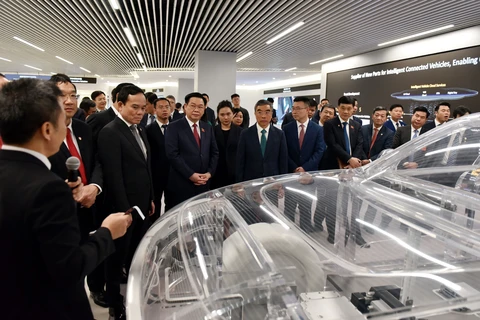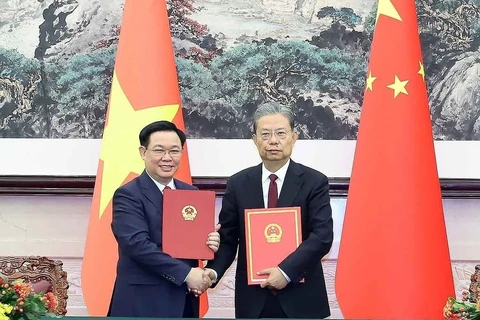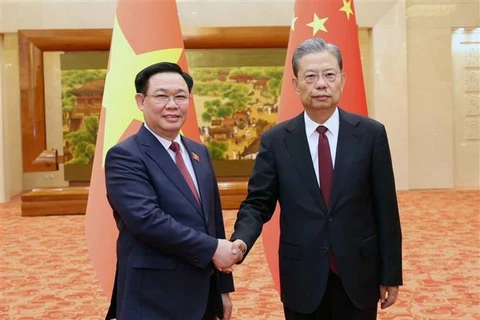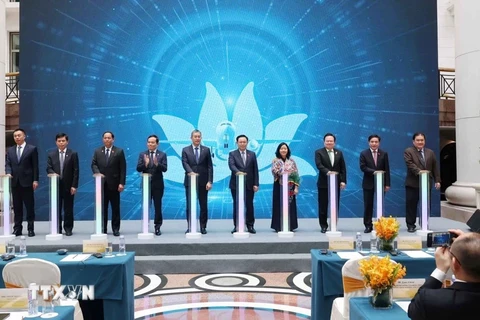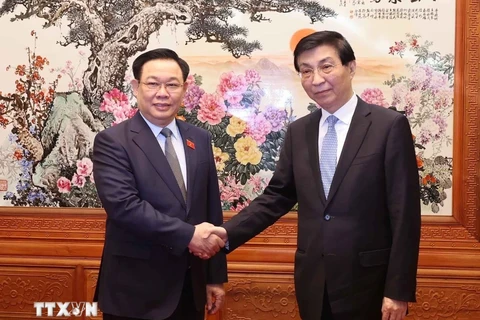Beijing (VNA) – National Assembly Chairman Vuong Dinh Hue attended a Vietnam - China seminar on State-owned enterprises (SoE) reform and management of state capital at enterprises in Beijing on April 9.
The event, part of the top legislator’s official visit to China, saw the presence of Vietnamese and Chinese officials and 250 delegates representing over 100 businesses of the two countries.
In his opening remarks, Vietnamese Deputy Prime Minister Tran Luu Quang emphasised the significance and progress of bilateral economic, trade, and investment cooperation, including partnerships between the two business circles, which, he said, is generating tangible and long-term benefits for both sides.
He also highlighted similarities between the socio-economic development viewpoints of Vietnam and China, including prioritising sustainable development that centres on people and bases on science, technology, and innovation.
 Vietnamese Deputy Prime Minister Tran Luu Quang addresses the seminar in Beijing on April 9. (Photo: VNA) Nguyen Hoang Anh, Chairman of the Vietnamese Commission for Management of State Capital at Enterprises, noted the special importance of SoEs which contribute to almost 30% of Vietnam’s GDP, employ about 700,000 workers (accounting for 7.3% of all businesses’ workers), hold a leading role in some sectors, and generate a considerable source of revenue for the state budget.
Vietnamese Deputy Prime Minister Tran Luu Quang addresses the seminar in Beijing on April 9. (Photo: VNA) Nguyen Hoang Anh, Chairman of the Vietnamese Commission for Management of State Capital at Enterprises, noted the special importance of SoEs which contribute to almost 30% of Vietnam’s GDP, employ about 700,000 workers (accounting for 7.3% of all businesses’ workers), hold a leading role in some sectors, and generate a considerable source of revenue for the state budget.
However, SoEs in Vietnam still face certain shortcomings, he pointed out, elaborating that some still show limited efficiency, competitiveness has yet to match the resources they possess, and their outstanding role in boosting the development of other economic elements hasn’t been shown clearly.
Zhang Yuzhuo, Chairman of the State-owned Assets Supervision and Administration Commission of the State Council of China, stressed the necessity to promote the role and professionalism of state-owned capital supervision and management agencies, as well as fostering SoEs’ operations in the market and integration.
He said the seminar was an occasion for the two sides to discuss and work out solutions to challenges. As SoEs form a crucial force for national modernisation in each country, it is necessary to develop leading and open businesses with rich vitality that serve as pillars of the national economies, help with social stability, and are able to cope with crises.
At the event, participants discussed results and lessons of state-owned capital and asset management in China, SoE reform experiences and issues in Vietnam, along with other major matters. They also looked into ways to further improve SoEs’ role in each economy and the two countries’ economic cooperation./.
The event, part of the top legislator’s official visit to China, saw the presence of Vietnamese and Chinese officials and 250 delegates representing over 100 businesses of the two countries.
In his opening remarks, Vietnamese Deputy Prime Minister Tran Luu Quang emphasised the significance and progress of bilateral economic, trade, and investment cooperation, including partnerships between the two business circles, which, he said, is generating tangible and long-term benefits for both sides.
He also highlighted similarities between the socio-economic development viewpoints of Vietnam and China, including prioritising sustainable development that centres on people and bases on science, technology, and innovation.
 Vietnamese Deputy Prime Minister Tran Luu Quang addresses the seminar in Beijing on April 9. (Photo: VNA)
Vietnamese Deputy Prime Minister Tran Luu Quang addresses the seminar in Beijing on April 9. (Photo: VNA) However, SoEs in Vietnam still face certain shortcomings, he pointed out, elaborating that some still show limited efficiency, competitiveness has yet to match the resources they possess, and their outstanding role in boosting the development of other economic elements hasn’t been shown clearly.
Zhang Yuzhuo, Chairman of the State-owned Assets Supervision and Administration Commission of the State Council of China, stressed the necessity to promote the role and professionalism of state-owned capital supervision and management agencies, as well as fostering SoEs’ operations in the market and integration.
He said the seminar was an occasion for the two sides to discuss and work out solutions to challenges. As SoEs form a crucial force for national modernisation in each country, it is necessary to develop leading and open businesses with rich vitality that serve as pillars of the national economies, help with social stability, and are able to cope with crises.
At the event, participants discussed results and lessons of state-owned capital and asset management in China, SoE reform experiences and issues in Vietnam, along with other major matters. They also looked into ways to further improve SoEs’ role in each economy and the two countries’ economic cooperation./.
VNA

